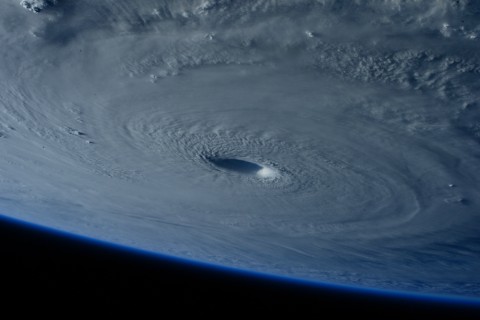After the evacuation order lifts, we go back to see what is left. Peregrine drives, and when we pass over the bridge he invokes the name of every sea god he knows, living and extinct, because neither of us are sure the bridge will hold.
On the island, water laps at the edges of route A1A, and tongues the front doors of the empty beach houses. We crawled flipper footed out of the ocean, and it longs to pull us under once more.
Halfway down, the road becomes impassable. We are some of the first people to return, because of Per’s job with the park service, and now we leave the car and walk alone on this seaweed scrap of land, stepping over branches and roof tiles, around splayed palm fronds that lie on the ground like a nymph’s discarded fans, down to the stucco 1980s interpretation of a Spanish mission where we rent a one-bedroom apartment with a small balcony that overlooks the Atlantic.
Inside, our unit has become a tide pool at low tide. The carpet squelches as we step. Barnacles upholster the furniture. Starfish cling to the mirrored wall in the living room, their tube feet reflecting in the glass like something so intimate and visceral that I have to look away.
There isn’t much to salvage. The electronics are a loss, and most of the books too. Our wedding certificate is a delta of inky rivers erasing our names. But Per and I hadn’t brought much with us anyway. We like to be unanchored to the world, even on this strip of beach where it feels like we might fall off the edge, a place where only pelicans are born and nothing, no one, is permanent. Even the land erases a small piece of itself with every pull of the moon.
In the bathtub, ctenophores beat their iridescent combs through a murky current. Per says he needs to check on the park service ferry, which carries visitors to the old stone fort that the Spanish once built to guard against pirates. At the fort, he shows people how the soldiers loaded their muskets, how they ate hardtack and played cards to ward off the hollowness inside them. Sometimes he rotates into town, which is billed as the oldest city in America, as though nothing had been here before, and leads tours of the colonial quarter and the old cathedral, with its four bells set into a white campanario against the burning Florida sky.
He doesn’t want to leave me, but I am watching the glittering rainbows of the comb jellies and say I will be fine, even though the smell of mildew is seeping into my hair. He touches my shoulder, makes sure I have bottled water before he goes.
Once I am alone, I pull the old marine biology book off the shelf and take it out to the balcony. The water-ruffled pages open like the shell of a clam. On the spore-speckled diagrams of the sea I trace how light disappears inside its benthic depths, the twilight zone, the midnight zone, the abyss. In the color plates I find the creatures I have seen in the living room and the ones I have seen in my dreams, everything that swims and skitters stalk-eyed and icicle-jawed, with mouths in their stomachs and eyes on their lips, the groping tentacles, the glowing lures. My insides rearrange into shapes they once knew. I am unevolving.
“The ferry dock is completely destroyed,” Per says when he returns. His beard is streaked with grayish green tangles like he is sprouting Spanish moss.
“How long will it take to fix?” I ask.
“Months, if the funds ever get approved,” he says.
Per looks back at the ruined apartment, at the slime mold that grows in the kitchen where he seared me fresh-caught fish, and the horseshoe crabs that scuttle in the bedroom where I changed out of my waitressing uniform each night and slipped under the sheets next to him, our bodies a salty and wet meridian.
Incisors shuffle in my gums, sharpening into translucent scythes. I run my tongue over them and taste iron. I want to take Per back into the brooding and festering bedroom and sink my teeth into his pith.
“I guess we’re lucky the storm didn’t make landfall,” he says. He holds the balcony railing, his shoulders heavy, waterlogged. “It could have been a lot worse.”
“It will be,” I say, and the ever-warming sea whispers all that you love will one day be lost, already tasting in its riptides the churning remnants of beach condos and summer palaces, fixing its eyewall gaze even on those old landmarks that have stood for centuries, the white campanario and the silver cross of the cathedral tumbling like driftwood, the bells bronze medusae that toll the siren song of the midnight zone, pulling us farther, deeper, in the gyre of the earth.
Per stands next to me on the balcony and the air pressure changes, a tropical wave. Electromagnetic pulses from his body crackle through my pores. Tentacles of hair hang over my shoulders. They sway with a new ontogeny. They loop around his wrist, with suction cups and venom glands, and all I will become.

Notes from Guest Reader Kristen Arnett
I selected the piece because it did an incredible job of making the setting come alive — the backdrop, St. Augustine post-hurricane, functioned as a very real, very visceral character. As I read the story, I was continually impressed by how the author chose to reveal the sea taking back the land. The morphing of the apartment into seascape felt extremely well crafted. By the end, I felt like I had discovered something new and interesting about place.


 The core workshop of SmokeLong Fitness is all in writing, so you can take part from anywhere at anytime. We are excited about creating a supportive, consistent and structured environment for flash writers to work on their craft in a community. We are thrilled and proud to say that our workshop participants have won, placed, or been listed in every major flash competition. Community works.
The core workshop of SmokeLong Fitness is all in writing, so you can take part from anywhere at anytime. We are excited about creating a supportive, consistent and structured environment for flash writers to work on their craft in a community. We are thrilled and proud to say that our workshop participants have won, placed, or been listed in every major flash competition. Community works.